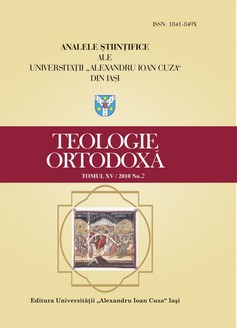Natural Theology and Reasonable Faith of the Christian Community in the Theological Work of Dumitru Staniloae
Natural Theology and Reasonable Faith of the Christian Community in the Theological Work of Dumitru Staniloae
Author(s): Gheorghe PetraruSubject(s): Christian Theology and Religion
Published by: Editura Universităţii »Alexandru Ioan Cuza« din Iaşi
Keywords: God; man; nature; space-time order; faith; communion
Summary/Abstract: Natural theology has a basis in the way of being of the Romanian people rooted deeply in a philosophy of space and time conceived as a divine order. (E. Bernea, C. Nicolescu) Specific to Romanian thinking is the deep link between nature as cosmic order divinely brought to being and humankind. This is a cosmic vision which integrates God, man and nature in a specific way, in a religious philosophy. Some Romanian thinkers (S. Mehedinti, C. Rădulescu-Motru) even created a split between Church and popular Christianity, based on cultural reasons, but D. Stăniloae rejects this vision. Drawing on Eastern Orthodox theology, his approach is a deep theological one, including popular spirituality (R. Gaillardetz) and cosmic vision in a intimate triangle which includes God who reveals his smiling and bright face, man in his opened faith, in fact a rational relation to otherness, be it transcendent or immanent, and nature as a space and time for the world existence of human beings. God and nature are very close to the human being, in a real and actual communion expresed in a warm, sensible poetical language. There is an intimate and powerful involvement between the three factors, i.e. God, man and nature, inviting not only to surpass the mind and the limits of the the human being and the nature, but also to a commitment to contemplative exercise act and to an eucharistic manner of living, as permanent gratitude in a large sense for the life and joy of man. It might be said that Stăniloae’s vision is a holistic one, surpassing the subjective philosophy of the Western world, the gap between man and nature, the rejection of the divine in an atheist, scientist or secular sense. His theology is also a way to wisdom in our cultural and Christian Tradition, opening to theist ecology and a theological anthropology in the Church as way of being in communion with God in our world. To be religious, to witness the faith, to participate in the liturgical service is normal, natural (W. Kasper), but is also beyond nature because this is the gift of God in Christ even to the mind of the man in this scientific era.
Journal: Analele Ştiinţifice ale Universităţii »Alexandru Ioan Cuza« din Iaşi. Teologie Ortodoxă
- Issue Year: 2010
- Issue No: 2
- Page Range: 71-83
- Page Count: 13
- Language: English

